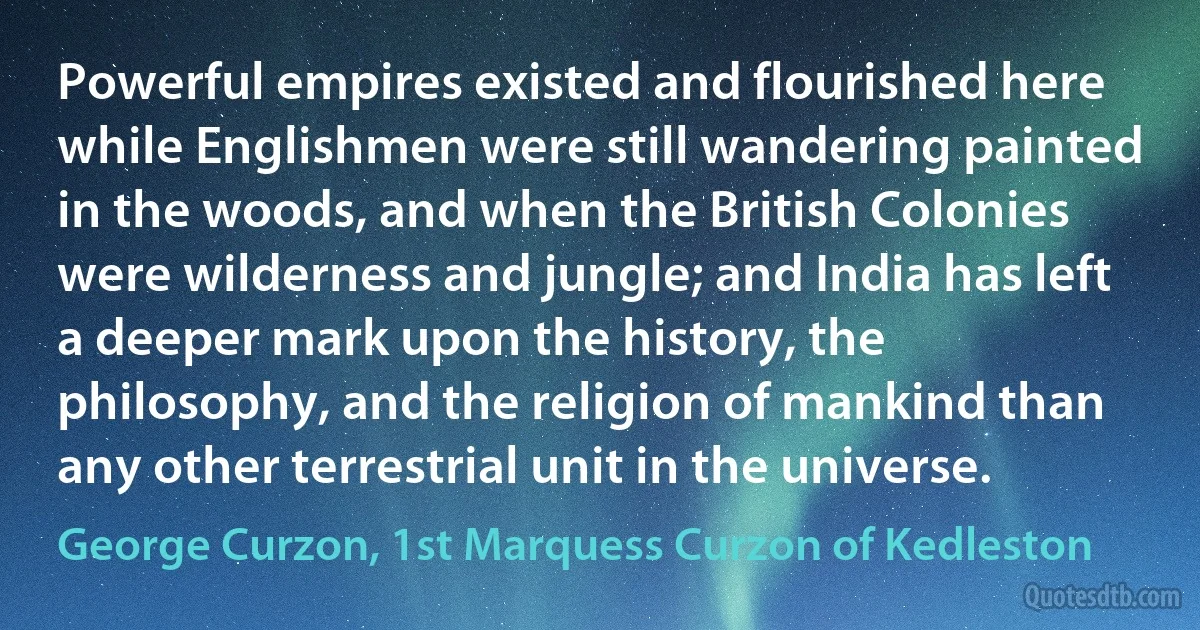George Curzon, 1st Marquess Curzon of Kedleston quotes
To fight for the right, to abhor the imperfect, the unjust, or the mean, to swerve neither to the right hand nor to the left, to care nothing for flattery or applause or odium or abuse-it is so easy to have any of them in India-never to let your enthusiasm be soured or your courage grow dim, but to remember that the Almighty has placed your hand on the greatest of His ploughs, in whose furrow the nations of the future are germinating and taking shape, to drive the blade a little forward in your time, and to feel that somewhere among these millions you have left a little justice or happiness or prosperity, a sense of manliness or moral dignity, a spring of patriotism, a dawn of intellectual enlightenment, or a stirring of duty, where it did not before exist-that is enough, that is the Englishman's justification in India. It is good enough for his watchword while he is here, for his epitaph when he is gone. I have worked for no other aim. Let India be my judge.

George Curzon, 1st Marquess Curzon of Kedleston
We are ordained to walk here in the same track together for many a long day to come. You cannot do without us. We should be impotent without you. Let the Englishman and the Indian accept the consecration of a union that is so mysterious as to have in it something of the divine, and let our common ideal be a united country and a happier people.

George Curzon, 1st Marquess Curzon of Kedleston
We must put an end to anything which brings about any Islamic unity between the sons of the Muslims. As we have already succeeded in finishing off the Caliphate, so we must ensure that there will never rise again unity for the Muslims, whether it be intellectual or cultural unity.

George Curzon, 1st Marquess Curzon of Kedleston
It is not one, I think, of which we have any cause to be ashamed. We have endeavoured to exercise a steadying and moderating influence in the politics of the world, and I think and hope that we have conveyed not merely the impression, but the conviction that, whatever other Governments or countries may do, the British Government is never untrue to its word, is never disloyal to its colleagues or its allies, never does anything underhand or mean; and if this conviction be widespread, as I believe it to be, that is the real basis of the moral authority which the British Empire has long exerted and, I believe, will long continue to exert in the affairs of mankind.

George Curzon, 1st Marquess Curzon of Kedleston
Curzon told the Asiatic Society of Bengal: If there be any one who says to me that there is no duty devolving upon a Christian Government to preserve the monuments of a pagan art, or the sanctuaries of an alien faith, I cannot pause to argue with such a man. Art and beauty, and the reverence that is owing to all that has evoked human genius or has inspired human faith, are independent of creeds, and, in so far as they touch the sphere of religion, are embraced by the common religion of all mankind.... There is no principle of artistic discrimination between the mausoleum of the despot and the sepulchre of the saint. What is beautiful, what is historic, what tears the mask off the face of the past, and helps us to read its riddles, and to look it in the eyes-these, and not the dogmas of a combative theology, are the principle criteria to which we must look.52.

George Curzon, 1st Marquess Curzon of Kedleston
We have endeavoured to render the land revenue more equable in its incidence, to lift the load of usury from the shoulders of the peasant, and to check that reckless alienation of the soil which in many parts of the country was fast converting him from a free proprietor to a bond slave. We have done our best to encourage industries which little by little will relieve the congested field of agriculture, develop the indigenous resources of India, and make that country more and more self-providing in the future. I would not indulge in any boast, but I dare to think that as a result of these efforts I can point to an India that is more prosperous, more contented, and more hopeful. Wealth is increasing in India. There is no test you can apply which does not demonstrate it. Trade is growing. Evidences of progress and prosperity are multiplying on every side.6°.

George Curzon, 1st Marquess Curzon of Kedleston


